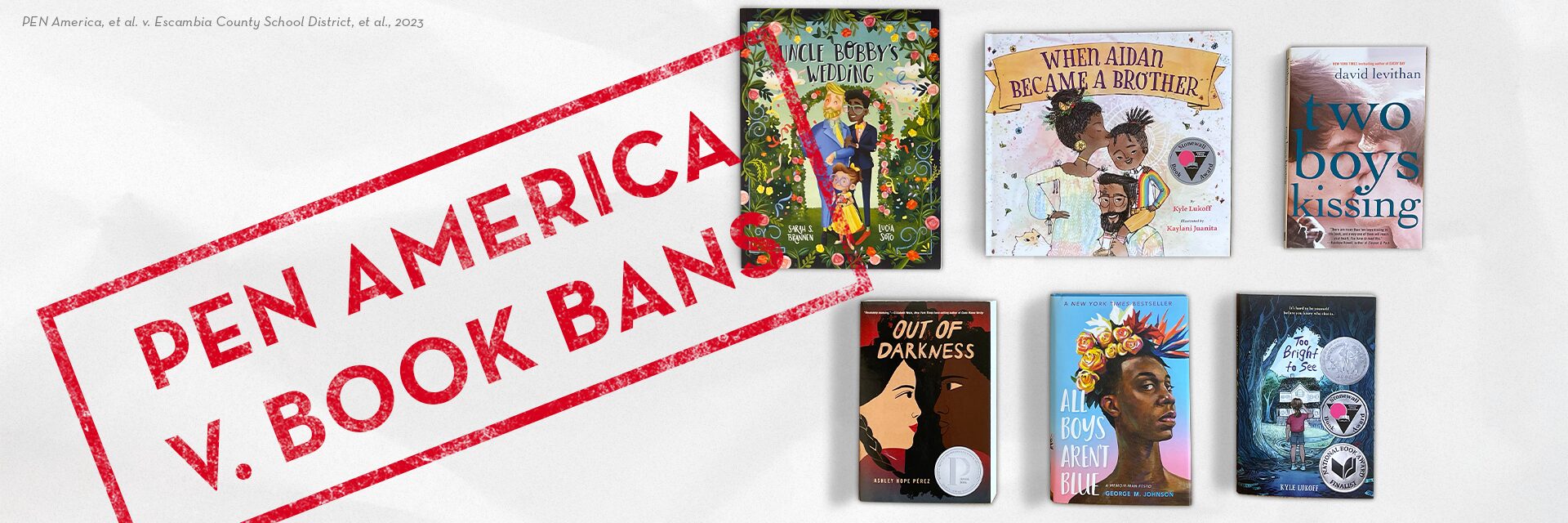
PEN America v. Escambia County School District
Updated October 9, 2024
In May 2023, PEN America, Penguin Random House, and a diverse group of authors joined with parents and students in Escambia County, Florida, to file a federal lawsuit challenging removals and restrictions of books from school libraries that violate their rights to free speech and equal protection under the law.
This lawsuit brings together authors whose books have been removed or restricted and parents and students in the district who cannot access the books, in a groundbreaking challenge to unlawful censorship.
Ensuring that students have access to books on a wide range of topics and a diversity of viewpoints, a core function of public education — preparing students to be thoughtful and engaged citizens.
The lawsuit says the Escambia County School District violated the First Amendment rights of the students, authors, and publishers by removing books during the 2022-2023 school year “based on ideological objections to their contents or disagreement with their messages or themes.” The books targeted for removal disproportionately addressed themes and messages related to race and LGBTQ+ identity. As documented by PEN America, Florida continues to have one of the highest rates of book removals and restrictions in the country.
In January 2024, Judge T. Kent Wetherell of the United States District Court for the Northern District of Florida heard oral arguments on the school district’s motion to dismiss. In an order from the bench, Judge Wetherell denied the school district’s motion to dismiss on the First Amendment claims, finding standing for all plaintiffs and rejecting the school district’s argument that the book removals constituted government speech not subject to First Amendment scrutiny. The court dismissed plaintiffs’ equal protection claims.
In October 2024, PEN America and other plaintiffs filed a motion to amend the complaint to challenge the school district’s policy implementing HB 1069. This was based on information learned in the discovery process, which revealed that the school board was continuing to keep books subject to a HB 1069 review off shelves, with no reasonable timeline for review. The amended complaint seeks a reasonable and timely review process for all books subject to objection and review.
The discovery process also revealed that 24 previously-restricted books had been returned to the shelves in response to pressure from this lawsuit and other litigation throughout the state. Books by two authors who were original plaintiffs in the suit, David Levithan and Sarah S. Brannen, were among those returned to shelves, as well as one title by children’s author Kyle Lukoff (another of his books remains restricted). Books by other author plaintiffs in the suit, George M. Johnson and Ashley Hope Pérez, remain restricted.
- 7/21/2023 First Amended Complaint >>
- 1/12/2024 Judge Wetherell’s Order on the Motion to Dismiss >>
- 10/4/2024 – Motion to Amend First Amended Complaint >>
- 8/25/2025 – Second Amended Complaint >>
If you’d like to help PEN America document and fight book bans, support our work today.
FAQ
What claims does the lawsuit allege?
The most recent amended complaint alleges that Escambia County School Board’s removal and restriction of books (I) constitute viewpoint discrimination barred under the First Amendment, (II) violate students’ right to receive information under the First Amendment, and (III) are guided by a policy that results in unconstitutional indefinite delays of students’ access to information.
What does the judge’s January order on the motion to dismiss mean?
Judge Wetherell’s order means that the lawsuit can move forward on the two First Amendment counts. It is not a final decision on the merits. In determining whether or not to grant a motion to dismiss, the court must accept all of the plaintiffs’ factual allegations as true and decide whether or not they have stated a plausible legal claim. Judge Wetherell found that all plaintiffs had standing, that the case was ripe and not moot, and that the plaintiffs stated plausible First Amendment claims. He found that plaintiffs had not stated a claim for plausible relief under the Equal Protection Clause of the Fourteenth Amendment, and those claims were dismissed.
Why is Judge Wetherell’s opinion important?
Judge Wetherell’s order is an important victory for this case and for book banning cases around the country. Previous plaintiffs have struggled to establish standing in similar cases, so this opinion provides support for other similar claims and similarly situated potential plaintiffs. Judge Wetherell’s rejection of the government speech doctrine is also significant, as state governments and local agencies have turned to the government speech doctrine in an attempt to immunize their censorship of literature from Constitutional scrutiny. The government speech doctrine stipulates that the government’s speech is free from First Amendment scrutiny when it speaks for itself, which governments must do to function. Examples of government speech would include lowering the flag out of commemoration or respect, acknowledging public holidays, or implementing its own policies. However, Judge Wetherell rejected outright the school district’s argument that the government speech doctrine applies to library book removals, noting that applying the doctrine in this context would set a dangerous precedent. Judge Wetherell’s rejection of this harmful idea provides further support for challenges against educational censorship nationwide. Now that the case is moving forward to discovery, our author plaintiffs and parent/student plaintiffs will have an opportunity to demonstrate to the court (and the public) the detrimental effects of these book bans and the importance of access to diverse literature.
How does HB 1069 affect this lawsuit?
The book removals and restrictions at issue in this lawsuit took place before Florida’s HB 1069 went into effect; however, since it was enacted, many of the books have also been subject to review under HB 1069. In October 2024, PEN America and other plaintiffs filed a motion to amend their complaint to reflect information gleaned in the discovery process about the school board’s policy implementing HB 1069. The complaint challenges the school district’s policy for failing to ensure a timely review process that comports with the Constitution. The school district has restricted or removed more than 1600 titles for at least some duration since their HB 1069 review process began. In addition to the books at issue in the lawsuit, these titles include Anne Frank’s Diary of a Young Girl, The Autobiography of Malcolm X, The Guinness Book of World Records, and five dictionaries.
Why are authors plaintiffs in the lawsuit?
Authors George M. Johnson (All Boys Aren’t Blue), Kyle Lukoff (When Aidan Became a Brother), and Ashley Hope Pérez (Out of Darkness) all have written books that have been ordered removed or restricted from libraries in the school district and/or subjected to restricted access within such libraries and kept from students as a result. Restricting access to books deprives the authors of the opportunity to engage with readers and disseminate their ideas to their intended audiences. Authors David Levithan (Two Boys Kissing) and Sarah S. Brannen (Uncle Bobby’s Wedding) were initially plaintiffs in the lawsuit, but their books were returned to shelves prior to the filing of the most recent amended complaint.
Why is PEN America a plaintiff?
PEN America stands at the intersection of literature and human rights to protect open expression in the United States and worldwide. We champion the freedom to write, recognizing the power of the word to transform the world. Our mission is to unite writers and their allies to celebrate creative expression and defend the liberties that make it possible. PEN America is a nonprofit, member-based organization that represents authors throughout the United States. Members of PEN America include Judy Blume (Forever…), Chimamanda Ngozi Adichie (Half of a Yellow Sun), Margaret Atwood (The Handmaid’s Tale), Alex Gino (Melissa), John Green (Looking for Alaska), Khaled Hosseini (The Kite Runner), Susan Kuklin (Beyond Magenta), and Jodi Picoult (Nineteen Minutes). Founded in 1922, PEN America works to ensure that people everywhere have the freedom to create literature, to convey information and ideas, to express their views, and to access the views, ideas, and literatures of others. PEN America counts many authors with removed and restricted books among its members. PEN America has joined with parents, students, and authors to vindicate their rights and to ensure that public school libraries continue to be spaces dedicated to the exploration and dissemination of a variety of ideas, points of view, and experiences, free from government viewpoint discrimination and discrimination based upon race, sexuality, or gender identity.
Why is Penguin Random House a plaintiff?
As the world’s largest trade book publisher, Penguin Random House is resolute in its commitment to free expression and protecting the freedom to read. With a mission to create books for everyone, more than 300 imprints, 16,000+ new titles published annually, and brands on six continents, Penguin Random House is home to diverse stories with wide-spanning perspectives and supports their authors in reaching as many readers as possible. Penguin Random House comprises adult and children’s fiction and nonfiction print and digital English- German- and Spanish-language trade book publishing businesses in more than 20 countries worldwide. With more than 700 million print, audio and eBooks sold annually, Penguin Random House’s publishing lists include more than 80 Nobel Prize laureates, numerous Newbery and Caldecott awards, and many of the world’s most widely read authors. Penguin Random House publishes hundreds of authors with banned or challenged books, including plaintiffs in the lawsuit: Kyle Lukoff and Ashley Hope Pérez; as well as the late Toni Morrison, who was also targeted in Escambia County’s bans.
Why Escambia County?
The Escambia County School Board is at the heart of the efforts to remove and restrict books in Florida. In September 2022, a teacher in one of the district schools filed challenges to over 100 book titles requesting their removal from school libraries, with many such challenges based on racial or LBTQ+ animus. The district responded by moving these challenged books to “restricted” areas, where students may not peruse them or check them out without first receiving parental permission. Over the ensuing eight months the school board voted to permanently remove 10 books from school libraries, in many cases overriding the recommendation of district review committees formed to evaluate them. Despite this lawsuit, ECSB continues to remove access to books. As of the time of filing, publicly available data indicates more than 65% of targeted books remain restricted indefinitely, requiring specific parental permission, across elementary, middle, and high schools. Escambia County epitomizes the censorship efforts in Florida that are being mimicked in school districts across the country. Though some of these districts’ removals and restrictions have proved temporary, many like those in Escambia have involved summarily removing books before any considered evaluation took place. Prohibiting access to books “pending investigation” is contrary to best practice guidance for the review of challenged books in public schools. Further, by burdening students with the stigma of requesting special access to books labeled as inappropriate, the District creates a profound chilling effect that undermines students’ ability to fully exercise their First Amendment right to openly access information.
What does PEN America hope the outcome will be?
The lawsuit asks that ECSB return the books to shelves immediately and permanently, that they prevent the removal and restriction of the books in the future, and that they change their policy implementing HB 1069 to ensure a timely review process. The lawsuit also seeks attorney fees and expenses.
Meet the Author Plaintiffs
Ashley Hope Pérez

Ashley Hope Pérez is the author of award-winning novels for young adults, including Out of Darkness, The Knife and the Butterfly, and What Can’t Wait. Out of Darkness was described by The New York Times Book Review as a “layered tale of color lines, love and struggle in an East Texas oil town,” and was selected as a best book of the year by both Kirkus and School Library Journal. It received a 2016 Printz Honor for Literary Excellence in Young Adult Fiction from the American Library Association, the 2016 Tomás Rivera Book Award, and the 2016 Américas Award. Despite being published in 2015 and never challenged until 2021, Out of Darkness has become one of the most frequently banned books in the U.S. over the past two years.Pérez is a former public high school English teacher, a parent, and a professor of world literature at The Ohio State University.
David Levithan

David Levithan is the author of over twenty books for kids and young adults, including the award-winning novels Boy Meets Boy, Two Boys Kissing, and Every Day. In 2016, he won the American Library Association’s Margaret A. Edwards Award for his meaningful contribution to young adult literature.
Kyle Lukoff

Kyle Lukoff is the author of many books for young readers. His debut middle-grade novel, Too Bright To See, received a Newbery honor, the Stonewall award, and was a National Book Award finalist. His picture book When Aidan Became A Brother also won the Stonewall, and his book Call Me Max has been banned in schools across the country. He has forthcoming books about apologies, vegetables, death, and lots of other topics. While becoming a writer he worked as a bookseller for ten years, and then nine more years as a school librarian.
Sarah S. Brannen

Sarah S. Brannen is the author of Uncle Bobby’s Wedding. When it was first published in 2008, Uncle Bobby’s Wedding was the first picture book about a same-sex wedding published by a U.S. publisher. The new edition, published in 2020, was named one of the 100 best children’s books of the past 100 years by Booktrust. It was named one of the best books of the year by Kirkus and Bank Street.Brannen also wrote and illustrated A Perfect Day, Bear Needs Help, Madame Martine, and Madame Martine Breaks the Rules. She has illustrated many books for children, including the Sibert Award honor book Summertime Sleepers; Seashells: More Than a Home; and Feathers: Not Just For Flying, all written by Melissa Stewart.
George M Johnson

George M Johnson is an award-winning Black non-binary writer, author, and executive producer located in the LA area. They are the author of the New York Times bestselling young adult memoir All Boys Aren’t Blue, which discusses their adolescence growing up as a young Black queer boy in New Jersey through a series of powerful essays. The book was optioned for television by Gabrielle Union. As a former journalist, George has written for major outlets including Teen Vogue, Entertainment Tonight, NBC, and Buzzfeed. In 2019 they were awarded the Salute to Excellence Award by the National Association of Black Journalists for their article “When Racism Anchors your Health” in Vice Magazine. George was listed on The Root 100 Most Influential African Americans in 2020. The Out 100 Most Influential LGBTQ People in 2021. And in 2022 was honored as one of the TIME 100 Next Most Influential People in the World.Their second memoir We Are Not Broken was released in September of 2021. It received the Carter G. Woodson Award which recognizes books that “accurately and sensitively depict the experience of one or more historically marginalized racial/ethnic groups in the United States.” The book also received the Nonfiction Honor Book in the YA category from the International Literacy Association. In 2021 they wrote and executive produced the dramatic reading of All Boys Aren’t Blue starring Jenifer Lewis and Dyllon Burnside which received a 2022 Special Recognition Award from GLAAD, and which has been nominated for an Emmy in the Daytime Special category, which will be presented at the Daytime Emmy ceremony in June 2023.George is also a proud HBCU alum twice over, and a member of Alpha Phi Alpha Fraternity Incorporated.
